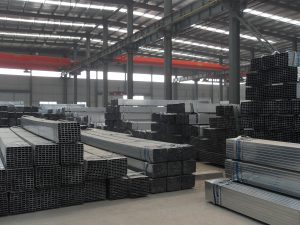Resistant to corrosion
Corrosion is a significant issue for pipes, particularly those used in industrial settings. Corrosion can cause leaks, blockages, and other problems that can be costly to fix. As such, steel pipe manufacturers must take steps to ensure that their pipes are resistant to corrosion. There are several methods that manufacturers can use to achieve this goal.

Material Selection
One of the most critical factors in ensuring that pipes are resistant to corrosion is the choice of materials. Manufacturers can choose from a range of materials, including metals, plastics, composites, and ceramics. Each material has its own unique properties, and some are more resistant to corrosion than others.
Metals such as stainless steel, copper, aluminum, and titanium are often used in pipe manufacturing because of their strength, durability, and corrosion resistance. Stainless steel, for example, is resistant to corrosion and can withstand high temperatures and pressures. Copper is an excellent conductor of heat and electricity, and it is resistant to corrosion. Aluminum is lightweight and resistant to corrosion, making it ideal for use in pipes that transport fluids and gases.
Protective Coatings
Another way that manufacturers can make their pipes resistant to corrosion is by applying protective coatings. These coatings act as a barrier between the pipe and the corrosive environment, preventing the API 5L pipe from being exposed to corrosive agents. There are several types of protective coatings that manufacturers can use, including:
Epoxy Coatings: Epoxy coatings are commonly used for water and sewage pipes. They are durable and can provide long-term corrosion protection. Epoxy coatings can also be applied to the inside of pipes to prevent corrosion from the inside out.
Polyethylene Coatings: Polyethylene coatings are often used in oil and gas pipelines. They are resistant to abrasion, impact, and weathering, and they can provide excellent corrosion protection. Polyethylene coatings can also be used to protect threaded pipe that are exposed to harsh environments, such as offshore oil rigs.
Zinc Coatings: Zinc coatings are often used in galvanized steel pipes. They provide excellent corrosion protection and can last for many years. Zinc coatings can also be used to repair corroded pipes by applying a thin layer of zinc to the surface of the pipe.
In conclusion, manufacturers can ensure that their pipes are resistant to corrosion by using a combination of material selection, protective coatings, cathodic protection, and monitoring and maintenance. Each of these methods has its own advantages and disadvantages, and the choice of method will depend on the specific application and environment in which the carbon steel pipes will be used. By taking these steps, manufacturers can ensure that their pipes remain corrosion-resistant, reducing the risk of leaks, blockages, and other problems that can be costly to fix.
Tel: +86 18202256900 Email: steel@tjdpbd.com
Previous: Steel pipe market and demands
Next: Quality Control Measures










